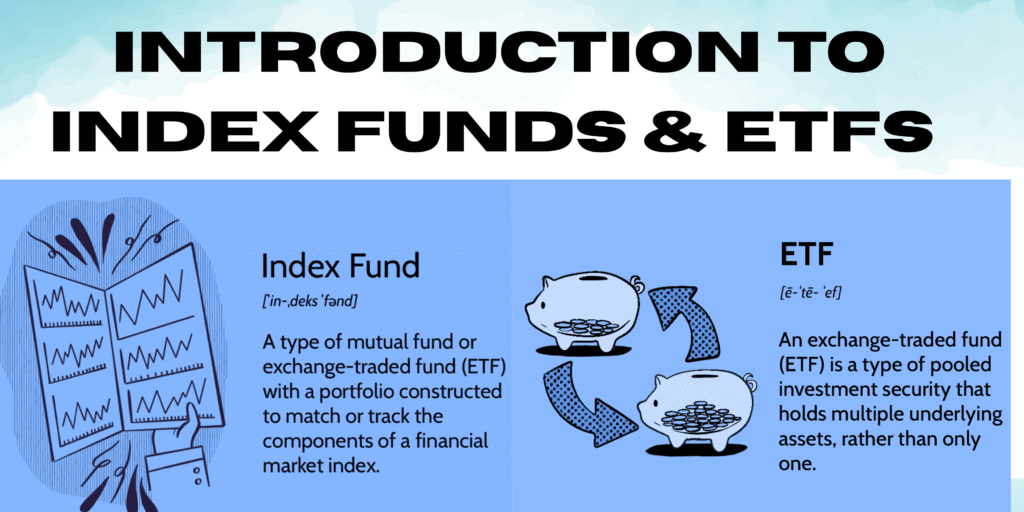“Don’t look for the needle in the haystack. Just buy the haystack.” – Jack Bogle, Founder of Vanguard (Pioneer of Index Funds)
If you’ve ever thought, “Investing sounds risky and complicated,” you’re not alone. Most people are intimidated by stocks and mutual funds. But what if there was a way to invest in the entire market without needing to pick individual stocks or time the market?
That’s exactly what Index Funds and ETFs (Exchange Traded Funds) are designed for.
What Is an Index?
Before we jump into index funds, you need to understand what an index is.
Think of an index as a basket of top companies.
Common Indian stock market indexes:
- Nifty 50 – Top 50 companies listed on NSE
- Sensex – Top 30 companies listed on BSE
- Nifty Next 50 – Next 50 after the top 50
These indexes represent the overall market performance.
What Is an Index Fund?
An Index Fund is a type of mutual fund that invests in the same companies that make up a stock market index, in the same proportion.
So, if Nifty 50 includes Reliance, Infosys, and HDFC Bank, the fund buys those too — in the same weight.
- No stock picking
- No fund manager making active decisions
- Just mimicking the index
Index Funds aim to match the market — not beat it.
What Is an ETF (Exchange Traded Fund)?
An ETF is similar to an index fund — but it trades like a stock on the stock market.
- It tracks an index (like Nifty or Sensex)
- You buy it via your demat/trading account
- Price changes during the day, just like any other stock
You can think of an ETF as a “stock version” of an index fund.
Index Fund vs ETF: What’s the Difference?
| Feature | Index Fund | ETF |
|---|---|---|
| How you buy | Through mutual fund platforms | Through stock brokers like Zerodha |
| Trading time | Once a day (end of day NAV) | Anytime during market hours |
| Requires Demat account? | No | Yes |
| SIP option available? | Yes | No (not easily) |
| Liquidity | Medium | High |
Why Index Funds & ETFs Are Great for Beginners
1. Simple & Transparent
You know exactly what you’re investing in — the top companies.
2. Low Cost
Because there’s no fund manager actively making decisions, fees are low. These are called low expense ratio funds.
Example: Active mutual funds may charge 1–2%, index funds charge 0.1–0.3%
3. Diversified
You’re investing in 50+ companies at once — spreading the risk.
4. Good Long-Term Performance
Most active funds fail to beat the index over the long term. Index funds just match it — and often do better than expensive active funds.
How Much Can You Earn?
Let’s take Nifty 50 as an example:
- Average return over the last 15 years = ~12% annually
- ₹5000/month in a Nifty Index Fund for 15 years = ₹25+ lakhs corpus
Note: Market returns are not guaranteed. But over 10+ years, indexes tend to grow along with the economy.
Popular Index Funds in India (Examples)
- Nippon India Index Fund – Nifty 50
- HDFC Index Fund – Nifty 50 Plan
- ICICI Prudential Nifty Next 50 Index Fund
- UTI Nifty 50 Index Fund
All available on apps like Groww, Zerodha Coin, Paytm Money, Kuvera
Popular ETFs in India
- Nippon India ETF Nifty BeES
- ICICI Prudential Nifty Next 50 ETF
- Motilal Oswal NASDAQ 100 ETF (tracks US tech giants like Apple, Google, Amazon)
You’ll need a demat account to invest in these — just like buying a stock.
When Should You Choose an Index Fund?
- You’re a beginner
- You want to invest for long term (5+ years)
- You want low cost, low maintenance investments
- You don’t want to track the market or read company news every day
Who Should Choose ETFs?
- You have a demat and trading account
- You prefer intra-day flexibility
- You want to build a custom portfolio
- You’re okay managing your investments yourself
How to Start Investing in Index Funds (Step-by-Step)
If You Want to Buy an Index Fund:
- Download mutual fund app (Groww, Kuvera, Coin)
- Complete KYC (PAN + Aadhaar)
- Search for “Nifty 50 Index Fund”
- Start SIP or lump sum
- Sit back, invest regularly
If You Want to Buy an ETF:
- Open demat account (Zerodha, Upstox, Angel One)
- Search for the ETF (e.g., Nifty BeES)
- Place order just like a stock
- Hold it long-term (no frequent trading)
Frequently Asked Questions (FAQs)
Q: Are index funds risky?
A: Like all equity investments, they carry market risk. But they are less risky than picking individual stocks.
Q: Can I lose money in an index fund?
A: Yes — in the short term. But historically, markets grow over long periods.
Q: Which is better — index fund or ETF?
A: For beginners: Index Fund. For experienced investors: ETF (more flexibility).
Q: Can I invest monthly?
A: Yes. SIPs (Systematic Investment Plans) are available for index funds, not ETFs.
Final Thoughts
Index Funds and ETFs are the smart, simple, and low-cost way to invest in the stock market — especially for beginners.
You don’t need to be a financial expert. You just need to:
- Start small
- Stay consistent
- Think long-term
“In investing, simplicity often wins over complexity.” – John Bogle
Whether it’s ₹500 or ₹5000 a month, let the market work for you — quietly, steadily, and over time.

